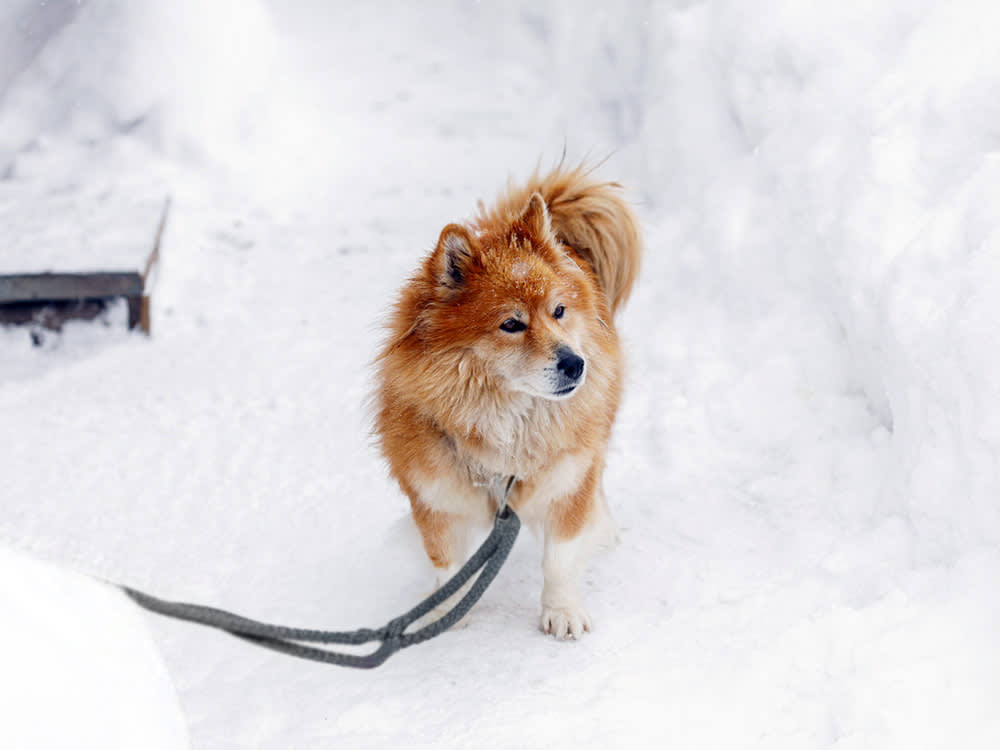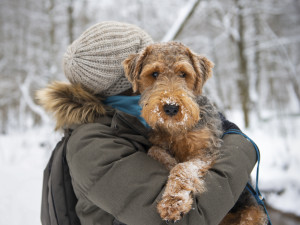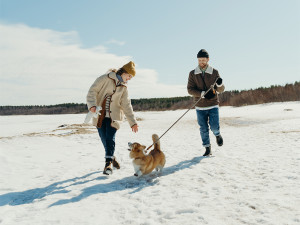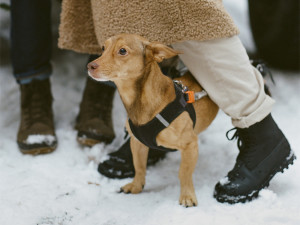It’s a Felony to Leave Your Dog Out in the Cold in These States
It’s illegal—and extremely dangerous.

Share Article
This past December, tragedy struck when three dogs were left outside of a residential home in Detroit, Michigan, in the bitter cold. Two froze to death. Their guardian was charged with three counts of killing and torturing an animal, two counts of abandoning and cruelty resulting in death, and one count of animal abandonment and cruelty. He could spend up to seven years in prison.
It was a devastating tragedy — and unfortunately, this kind of neglect is far from unusual. “It’s heartbreaking. We came across a lot of cases this year,” Chantal Rzewnicki, the founder of a volunteer-run nonprofit called the KARENS (aka “K9 Animal Rescue Emergency Networking System”), told WXYZ.opens in new tab “I would say this year has been the worst yet.”
It’s common sense not to leave a dog outside in freezing temperatures for long periods of time, but many pet parents aren’t aware of just how quickly cold weather can turn dangerous. Even fewer know that leaving a dog in the cold unattended for long periods of time is actually illegal — and in some states, it can even be considered a felony.
Why is it dangerous to leave dogs in the cold?
Like humans, dogs are at risk of frostbite if they’re exposed to frigid weather — and it doesn’t even have to be freezing out for frostbite to set in. “Frostbite can develop at temperatures above freezing if there is a severe wind chill or exposure to water,” veterinarian Dr. Bartley Harrison wrote for Kinship. “Without a steady blood supply, cells begin to die off. Water in the exposed tissues can also freeze, causing the cells to rupture.” This results in extreme pain, blisters, swelling, and dead skin or tissue.

Another serious risk is hypothermia. Hypothermia progresses in stages, and “each stage of hypothermia results in worsening the body’s ability to regulate its temperature, maintain brain and heart function, and preserve blood flow,” Dr. Harrison wrote. “Dogs experiencing cold stress will become progressively lethargic, weak, and mentally dull.” Because it slows a pup’s heart rate and breathing, hypothermia can lead to serious results including cardiac failure, coma, and death.
There are legal consequences of leaving dogs out in the cold.
Because of the risk of physical injury, leaving a dog unattended in the cold is considered animal neglect. Neglect is a form of animal cruelty defined by the Animal Legal Defense Fundopens in new tab as “the failure to provide basic care required for an animal to thrive.” Abandonment, hoarding, and failure to provide shelter are all examples of animal neglect. The consequence for these actions vary across the country and according to each specific case. In all 50 states, animal neglect is considered at least a misdemeanor — but some states carry more serious chargesopens in new tab.
In Massachusetts, any animal neglect case can be charged as a felony, with a potential prison sentenceopens in new tab of up to seven years. Neglect can also be charged as a felony in any case in Oklahomaopens in new tab, where it carries a sentence of up to five years in prison and/or a $5,000 fine.
In California, Connecticut, Delaware, Florida, Pennsylvania, and Washington, D.C., animal neglect can be considered a felony if the situation results in the death of an animal. Animal neglect is a misdemeanor in Georgiaopens in new tab, but it can carry a felony charge if aggravated cruelty is proven or the offense is repeated.
In 2017, Pennsylvania passed Libre’s Lawopens in new tab, which specifically made it a misdemeanor to tether a dog outside for more than 30 minutes in temperatures above 90 degrees or below 32 degrees; if a dog dies or is seriously injured, the case may be considered a felony. Many other states have anti-tethering lawsopens in new tab, including California, Illinois, and Texas.
This isn’t an exhaustive list, and each state has its own set of laws regarding animal cruelty. For example, in some states, second convictions of animal cruelty can be considered felonies. In others, a felony may be applied in cases of extremely torturous conditions or when malice and intent can be proven.
To find out your state’s laws regarding animal treatment, you can visit the University of Michigan’s Animal Legal and Historic Center mapopens in new tab.
Remember: If you’re cold, they’re cold.
Regardless of the legal ramifications, leaving an animal outside in the cold is extremely dangerous and cruel. It’s a memeopens in new tab, but it’s true: If you’re cold, they’re cold — bring them inside. If you see an animal abandoned out in low temps, the Humane Society recommendsopens in new tab that you “take note of the date, time, exact location, and the type of animal(s) involved and write down as many details as possible about the situation.”
You can then contact your local animal control agency to file a report. Depending on your location, there may be other outreach services available; for example, in New York City, you can call 311 to report animal neglect.

Sio Hornbuckle
Sio Hornbuckle is the Assistant Editor at Kinship, where they frequently write for the site. As a writer, they specialize in pet news, animal science, and pop culture. They live in New York City with their cat, Toni Collette.

Hilary Weaver
Hilary Weaver is the senior editor at Kinship. She has previously been an editor at The Spruce Pets, ELLE, and New York Magazine. She was a staff writer at Vanity Fair from 2016 to 2019, and her work has been featured in Esquire, Refinery 29, BuzzFeed, Parade, and more. She lives in New York City and New England with her family, which includes two herding pups, Georgie and Charlie.
Related articles
![Pit Bull dog wearing a coat on leash with person in the snow]()
Does Your Dog Need a Winter Coat?
Chilly pup refusing to layer? Here’s how to train them to love their cold-weather wardrobe.
![A woman holding a dog outside in the snow]()
How to Keep Your Dog Safe in Severe Winter Weather
Everything you need to know ahead of this weekend’s storm.
![Happy Chihuahua dog running outdoors wearing blue jacket in winter snow]()
23 Winter Trappings for the Dog With Outdoorsy Parents
Ski-club balaclavas, waterproof wellies, all-natural nose balm, and more gear to help outdoorsy pet parents get the most out of the season.
![Shetland sheepdog sits in front of a obstacle course for dogs in the living room]()
3 Fun Indoor Games to Play With Your Dog This Winter
Bad weather? These activities will keep your dog (and you!) from going stir crazy.
![A happy looking man and woman walking their dog outside in a large snowy field.]()
7 Professional Dog Walker Tips to Help You Survive Winter With Your Pup
How to make the snowy season your dog's favorite time of year.
![A couple bundled up for winter standing outside in the snow with their dog.]()
Can Dogs Get Frostbite?
Yep, all those warnings your mom gave you as a kid apply to your dog, too. Learn how to keep your pup safe in the cold.






